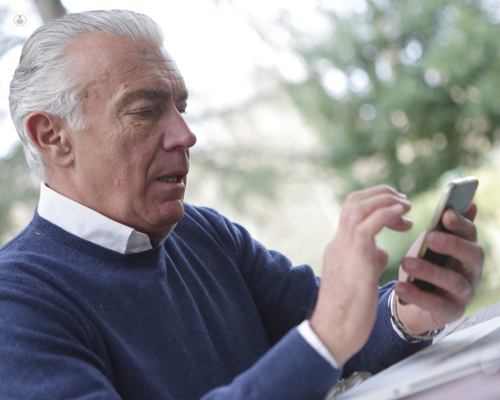Faecal Immunochemical Test (FIT) to detect bowel disease
Autore:The FIT test stands for Faecal Immunochemical Test, which is a test that measures the amount of human haemoglobin in the bowel contents very accurately and can determine whether someone is at risk for bowel cancer.
Here, one of our leading surgeons, Mr Arnold Christiaan Goede explains everything that you need to know about a FIT test, from who needs it, to how it works and what the results mean.

Who is likely to need a FIT test?
There are currently two scenarios where you might require a FIT test. The first is for those who are symptomatic and when you visit your GP, they will ask about your symptoms.
Bowel cancer symptoms include a change in bowel habit, loose stool, or abdomen pain and weight loss. If your symptoms are suggestive of bowel cancer, you will need to have a FIT test done to help decide if you are at risk and if you need to urgently be referred to a specialist.
The second scenario is when a patient is asymptomatic (no symptoms) and a FIT test is required for screening purposes. If you are aged between 60 and 75 years, you should be screened for bowel cancer every two years to identify if there is something wrong with your bowel.
What is a FIT test looking for?
If you have symptoms, then you must visit your GP and have a FIT test, blood test and a clinical examination. If there is rectal bleeding, then you don’t need a FIT test as it’s visible on rectal examination, but you will need to be referred to a specialist. If you are anaemic and have evidence of iron deficiency, you don’t need a FIT test, but you can opt to have one.
The FIT test is considered positive if it is higher than 10 micrograms in symptomatic patients. If the results show less than 10 micrograms, the risk of cancer is very low, in fact, less than 1 per cent. If it’s over 10 you will be referred to a specialist.
How does a FIT test work?
Your GP may organise a test in their practice or you can receive one through the post as a package. It includes a sealed envelope and a little container with a booklet and instructions.
There is an information leaflet with detailed instructions, which you need to follow very closely. It is important to make sure that your name and date of birth is on the sample cup.
There will be a request form that you need to sign to confirm that it is your sample so that the correct sample is to be analysed on your behalf.
Next you collect a bit of stool in the container, which is not difficult and there is usually a link to a website from different health authorities to explain how it is done.
Then you seal the container, put it back in the box with the request form and return as instructed. Some can be sent back by the post, but in other areas you may have to take it to your local hospital or to your GP.
What happens next?
Once you have returned your kit back to the hub that sent it out to you, they will let you know the result at their premise. Screening for bowel cancer runs separately from the NHS trust or your GP and runs on its own. Screening had been halted due to COVID-19 but it has restarted now*.
For patients with symptoms and a positive test with your GP, you will be referred to the NHS two-week wait referral urgent pathway, or you can be referred to a private specialist.
The gold standard test for bowel cancer is colonoscopy and the other option is a CT colonography, which is a scan that also images the colon.
Using colonoscopy, the doctor can view the colon really clearly and remove any polyps yet with a CT scan they cannot remove anything. The specialist will assess your symptoms, history and basis of your symptoms and will decide whether you should have colonoscopy, CT or a normal test.
What if the FIT test is negative and I still have symptoms?
There are a few options. Your GP can either do some further basic investigations, such as a blood test to look for other causes of symptoms like thyroid function. Whilst your doctor is making further tests, they will be keeping an eye on your symptoms. If they disappear and you get better, it may have been an infection.
Your GP will put a ‘safety net’ in place, which is a plan for 4-6 weeks that monitors whether your symptoms go away or not. If symptoms continue or get worse, you will be referred on an urgent pathway or to a less urgent pathway for symptoms that are probably not related to cancer.
*Information in this article related to COVID-19 is based on what is happening at the time of being published (November 2020) and is subject to change.
You can book an appointment with Mr Goede now via his Top Doctor’s profile here, if you would like his professional medical opinion in your case.


